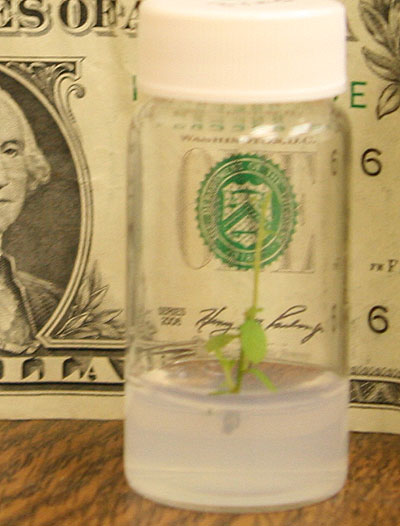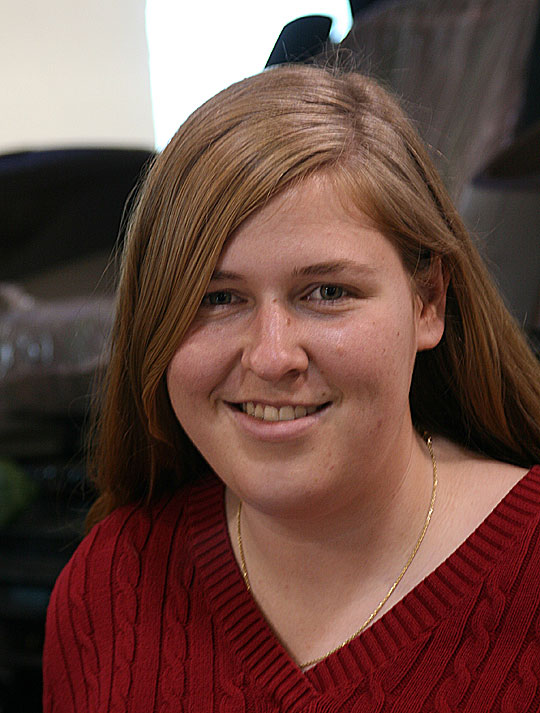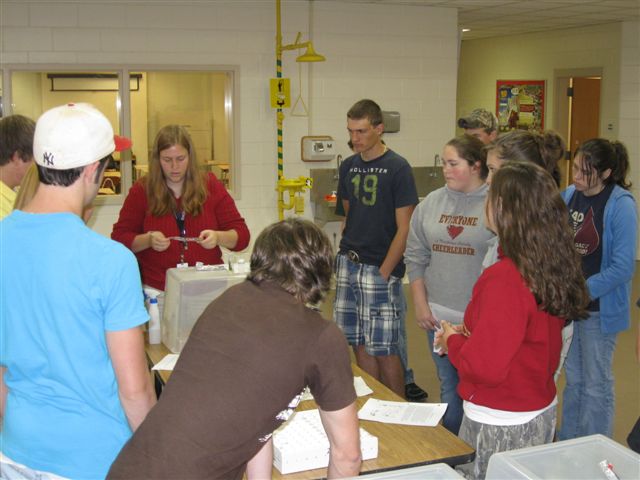Making Blueberries Cool: Northview’s Lesson In Genetic Engineering
May 11, 2009
The agricultural students at Northview High School are growing blueberries the high tech way with a little genetic engineering, thanks to a teaching intern that likes to make plants “cool”.
“The key to teaching is making it grab their attention, and I’ve figured out that kids are interested in the weirdest stuff,” said Jennifer Nobles, a recent University of Florida graduate who spent 12 weeks as an intern in the agricultural department at Northview.
 In a sterile lab-like environment, students planted blueberry snippets about 1-2 centimeters long into a sterile grown hormone gel packed with nutrients (pictured left). After about four weeks, the snippets will be little blueberry plants, transferred into pots and eventually ready to produce the popular fruit.
In a sterile lab-like environment, students planted blueberry snippets about 1-2 centimeters long into a sterile grown hormone gel packed with nutrients (pictured left). After about four weeks, the snippets will be little blueberry plants, transferred into pots and eventually ready to produce the popular fruit.
The growth process makes each plant a genetic clone of the others, producing even size plants that should yield a similar blueberry harvest. It’s the same method often used to create the perfect and identical plants found for sale at the local nursery, Nobles said.
“We have shown the students the cutting edge way to plant plants,” she said. “They found out that plants can be cool. It’s neat to watch them get excited about a subject that can be so plain.”
 Nobles’ 12-week internship at Northview ended recently, and she just graduated from UF where she double majored in animal science and agricultural education. Her next step in life is to attend veterinary school.
Nobles’ 12-week internship at Northview ended recently, and she just graduated from UF where she double majored in animal science and agricultural education. Her next step in life is to attend veterinary school.
Nobles said she will always treasure her 12 weeks at Northview.
“It was the coolest thing to see them get excited about planting blueberries, something that ordinarily can be so plain,” she said.
For photo gallery, click here.
Pictured top: Intern Jennifer Nobles show Northview agriculture students how to plant a blueberry snippet into a growth medium in a sterile environment. Pictured top inset: A blueberry snippet at about two weeks old. Pictured bottom inset: Jennifer Nobles. Submitted and NorthEscambia.com photos, click to enlarge.
Comments
9 Responses to “Making Blueberries Cool: Northview’s Lesson In Genetic Engineering”




Thanks.
http://www.epa.gov/opp00001/biopesticides/ingredients/factsheets/factsheet_046701.htm
This website provide the EPA Fact sheet on this chemical. It seems to be quite safe and commonly used on food crops.
The reason I ask the question about the rooting hormone is because someone
gave me some Green Light rooting hormone. And on the label it says not to use
on fruit bearing trees. It has Indole-3 butyric acid 0.10%. Some people say that by
the time the tree starts bearing fruit it should be okay. Is this true.
We had a lot of fun with K-Nobles, as we called her. && the micropropogation was a very fun lab. Good Luck in all that you do Miss Nobles, i’ll keep in touch! =]
Allie Vidak
2008-2009
NHS FFA Chapter
Vice President
Agar gel can be purchased in powder form, similar to Jello, online. The cost for our project, which made 125 plants, was about $200. The most economical way to practice this technique is to purchase what is called a kitchen kit. Keep in mind that not all plants can be cloned this way. The plant hormone used in the gel is called IP2. It is a natural hormone that plants produce to encourage new growth. It must be added to the gel because the pieces of plant being used are not large enough to produce their own IP2. It is completely safe to use for fruit-bearing plants.
My professors at UF assigned me to work with Mr. Byars based on my strengths and weaknesses, interests, personality, and preferences. They also considered Mr. Byars’ willingness to host an intern. I appreciate the opportunity to work with him and his students at Northview.
Please understand 2 things:
1) This is NOT genetic engineering, but simple rooting of cuttings. This “technology” has been around for ages – the rooting gel is just an updated process.
2) The gel does nothing magical to produce a clone. A clone is simply of genetically identical plants (in this case). A clone is commonly produced via vegetative propagation, which this is.
Is all plant growth hormones safe for fruit bearing trees and plants.
How did Ms. Nobles get hooked up with Northview vs some other school? What will become of the plants they have cloned? Can any of them be purchased by folks from this community? Thanks for your coverage on this project.
where can you get this gel? is it priced low enough to be economical for a person wanting to clone perrenial fruit plants for their personal garden?